Leisure Shopping: Marketing, Retail Management, Tourism Report
VerifiedAdded on 2020/03/04
|15
|3445
|111
Report
AI Summary
This report examines the multifaceted aspects of leisure shopping within the context of marketing, retail management, and tourism, particularly in rural settings. The research delves into the challenges faced by village shops in attracting customers and encouraging purchases of local arts, crafts, and food products. The study addresses key research questions, including the types of shopping experiences tourists seek, effective communication strategies for promoting local products, and optimal pricing strategies. Through a deductive research approach, the report analyzes existing literature to understand consumer behavior, the importance of tourism shopping, and the potential of rural tourism for economic development. It explores various variables, such as shopping experiences and purchasing decisions, and considers ethical issues related to research in rural areas. The report highlights the significance of understanding tourist motivations, the role of communication channels, and the impact of pricing strategies on the success of local businesses, offering insights into how retailers can enhance service delivery and customer satisfaction.
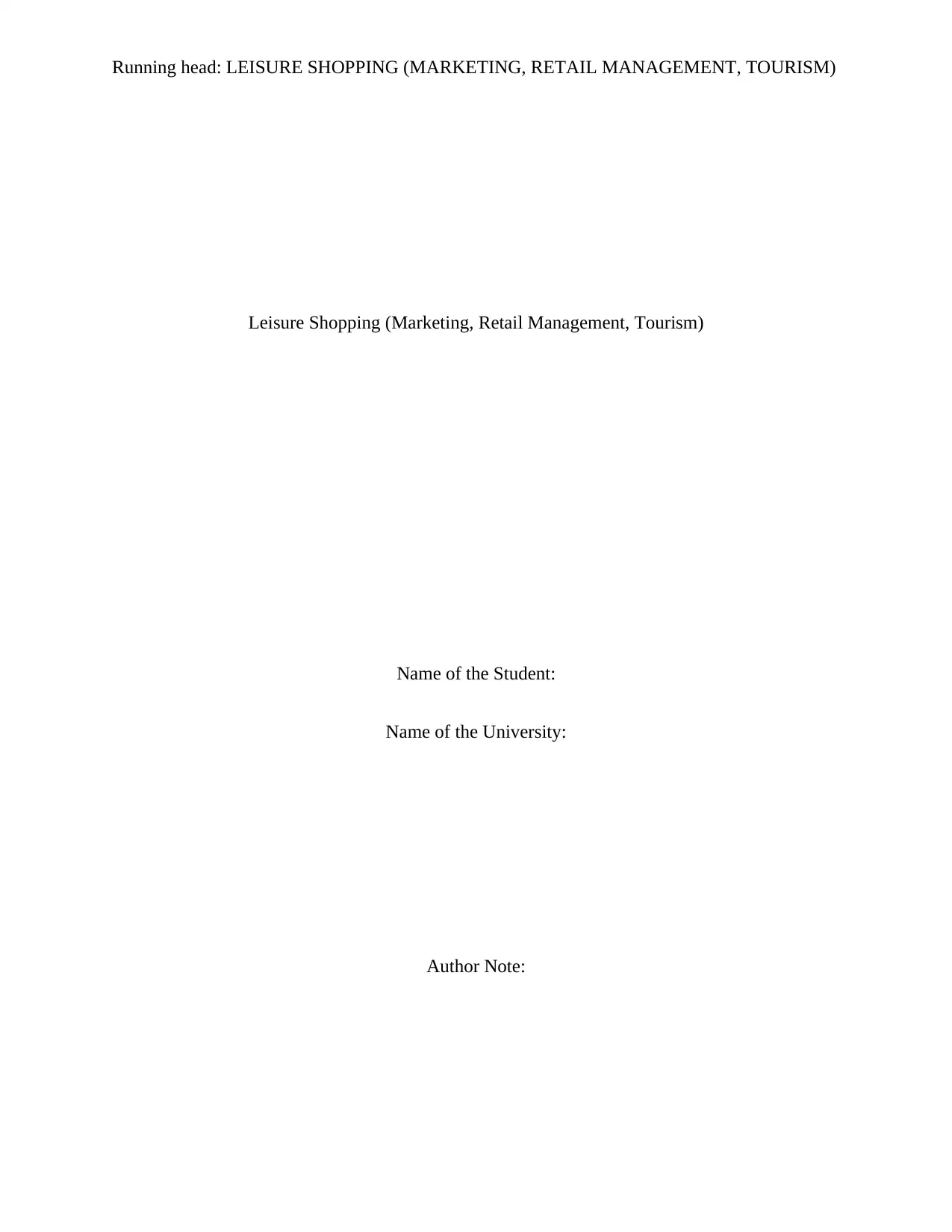
Running head: LEISURE SHOPPING (MARKETING, RETAIL MANAGEMENT, TOURISM)
Leisure Shopping (Marketing, Retail Management, Tourism)
Name of the Student:
Name of the University:
Author Note:
Leisure Shopping (Marketing, Retail Management, Tourism)
Name of the Student:
Name of the University:
Author Note:
Paraphrase This Document
Need a fresh take? Get an instant paraphrase of this document with our AI Paraphraser
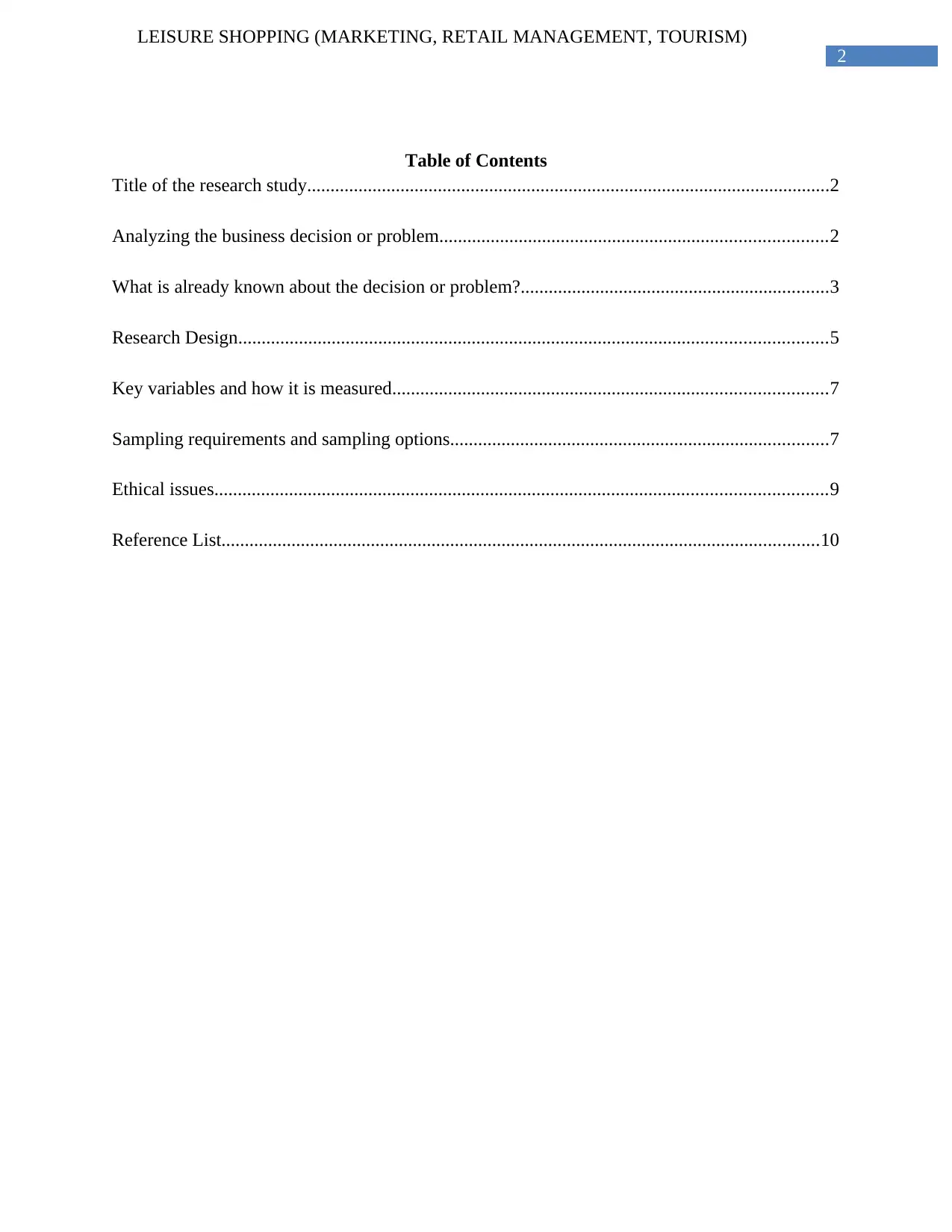
2
LEISURE SHOPPING (MARKETING, RETAIL MANAGEMENT, TOURISM)
Table of Contents
Title of the research study................................................................................................................2
Analyzing the business decision or problem...................................................................................2
What is already known about the decision or problem?..................................................................3
Research Design..............................................................................................................................5
Key variables and how it is measured.............................................................................................7
Sampling requirements and sampling options.................................................................................7
Ethical issues...................................................................................................................................9
Reference List................................................................................................................................10
LEISURE SHOPPING (MARKETING, RETAIL MANAGEMENT, TOURISM)
Table of Contents
Title of the research study................................................................................................................2
Analyzing the business decision or problem...................................................................................2
What is already known about the decision or problem?..................................................................3
Research Design..............................................................................................................................5
Key variables and how it is measured.............................................................................................7
Sampling requirements and sampling options.................................................................................7
Ethical issues...................................................................................................................................9
Reference List................................................................................................................................10
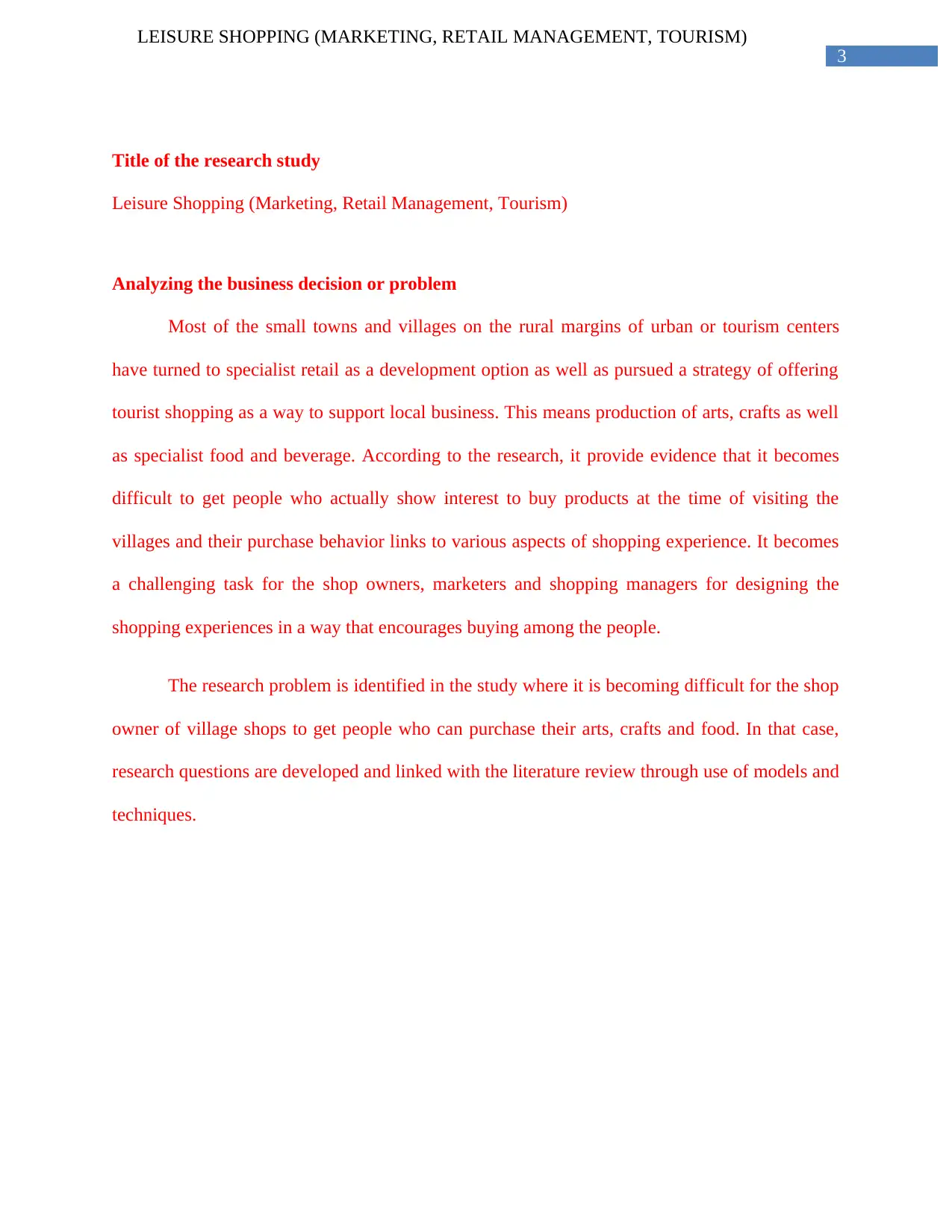
3
LEISURE SHOPPING (MARKETING, RETAIL MANAGEMENT, TOURISM)
Title of the research study
Leisure Shopping (Marketing, Retail Management, Tourism)
Analyzing the business decision or problem
Most of the small towns and villages on the rural margins of urban or tourism centers
have turned to specialist retail as a development option as well as pursued a strategy of offering
tourist shopping as a way to support local business. This means production of arts, crafts as well
as specialist food and beverage. According to the research, it provide evidence that it becomes
difficult to get people who actually show interest to buy products at the time of visiting the
villages and their purchase behavior links to various aspects of shopping experience. It becomes
a challenging task for the shop owners, marketers and shopping managers for designing the
shopping experiences in a way that encourages buying among the people.
The research problem is identified in the study where it is becoming difficult for the shop
owner of village shops to get people who can purchase their arts, crafts and food. In that case,
research questions are developed and linked with the literature review through use of models and
techniques.
LEISURE SHOPPING (MARKETING, RETAIL MANAGEMENT, TOURISM)
Title of the research study
Leisure Shopping (Marketing, Retail Management, Tourism)
Analyzing the business decision or problem
Most of the small towns and villages on the rural margins of urban or tourism centers
have turned to specialist retail as a development option as well as pursued a strategy of offering
tourist shopping as a way to support local business. This means production of arts, crafts as well
as specialist food and beverage. According to the research, it provide evidence that it becomes
difficult to get people who actually show interest to buy products at the time of visiting the
villages and their purchase behavior links to various aspects of shopping experience. It becomes
a challenging task for the shop owners, marketers and shopping managers for designing the
shopping experiences in a way that encourages buying among the people.
The research problem is identified in the study where it is becoming difficult for the shop
owner of village shops to get people who can purchase their arts, crafts and food. In that case,
research questions are developed and linked with the literature review through use of models and
techniques.
⊘ This is a preview!⊘
Do you want full access?
Subscribe today to unlock all pages.

Trusted by 1+ million students worldwide
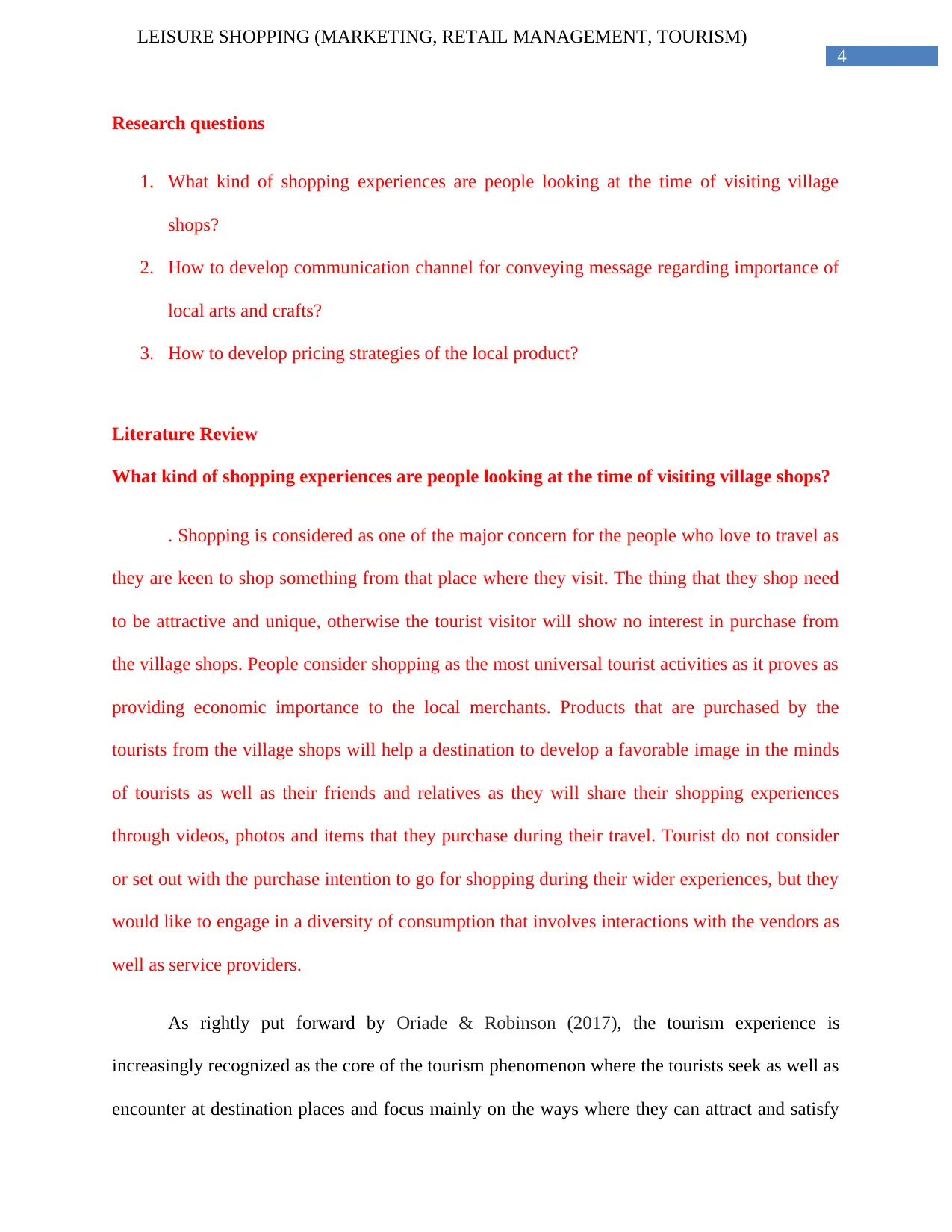
4
LEISURE SHOPPING (MARKETING, RETAIL MANAGEMENT, TOURISM)
Research questions
1. What kind of shopping experiences are people looking at the time of visiting village
shops?
2. How to develop communication channel for conveying message regarding importance of
local arts and crafts?
3. How to develop pricing strategies of the local product?
Literature Review
What kind of shopping experiences are people looking at the time of visiting village shops?
. Shopping is considered as one of the major concern for the people who love to travel as
they are keen to shop something from that place where they visit. The thing that they shop need
to be attractive and unique, otherwise the tourist visitor will show no interest in purchase from
the village shops. People consider shopping as the most universal tourist activities as it proves as
providing economic importance to the local merchants. Products that are purchased by the
tourists from the village shops will help a destination to develop a favorable image in the minds
of tourists as well as their friends and relatives as they will share their shopping experiences
through videos, photos and items that they purchase during their travel. Tourist do not consider
or set out with the purchase intention to go for shopping during their wider experiences, but they
would like to engage in a diversity of consumption that involves interactions with the vendors as
well as service providers.
As rightly put forward by Oriade & Robinson (2017), the tourism experience is
increasingly recognized as the core of the tourism phenomenon where the tourists seek as well as
encounter at destination places and focus mainly on the ways where they can attract and satisfy
LEISURE SHOPPING (MARKETING, RETAIL MANAGEMENT, TOURISM)
Research questions
1. What kind of shopping experiences are people looking at the time of visiting village
shops?
2. How to develop communication channel for conveying message regarding importance of
local arts and crafts?
3. How to develop pricing strategies of the local product?
Literature Review
What kind of shopping experiences are people looking at the time of visiting village shops?
. Shopping is considered as one of the major concern for the people who love to travel as
they are keen to shop something from that place where they visit. The thing that they shop need
to be attractive and unique, otherwise the tourist visitor will show no interest in purchase from
the village shops. People consider shopping as the most universal tourist activities as it proves as
providing economic importance to the local merchants. Products that are purchased by the
tourists from the village shops will help a destination to develop a favorable image in the minds
of tourists as well as their friends and relatives as they will share their shopping experiences
through videos, photos and items that they purchase during their travel. Tourist do not consider
or set out with the purchase intention to go for shopping during their wider experiences, but they
would like to engage in a diversity of consumption that involves interactions with the vendors as
well as service providers.
As rightly put forward by Oriade & Robinson (2017), the tourism experience is
increasingly recognized as the core of the tourism phenomenon where the tourists seek as well as
encounter at destination places and focus mainly on the ways where they can attract and satisfy
Paraphrase This Document
Need a fresh take? Get an instant paraphrase of this document with our AI Paraphraser
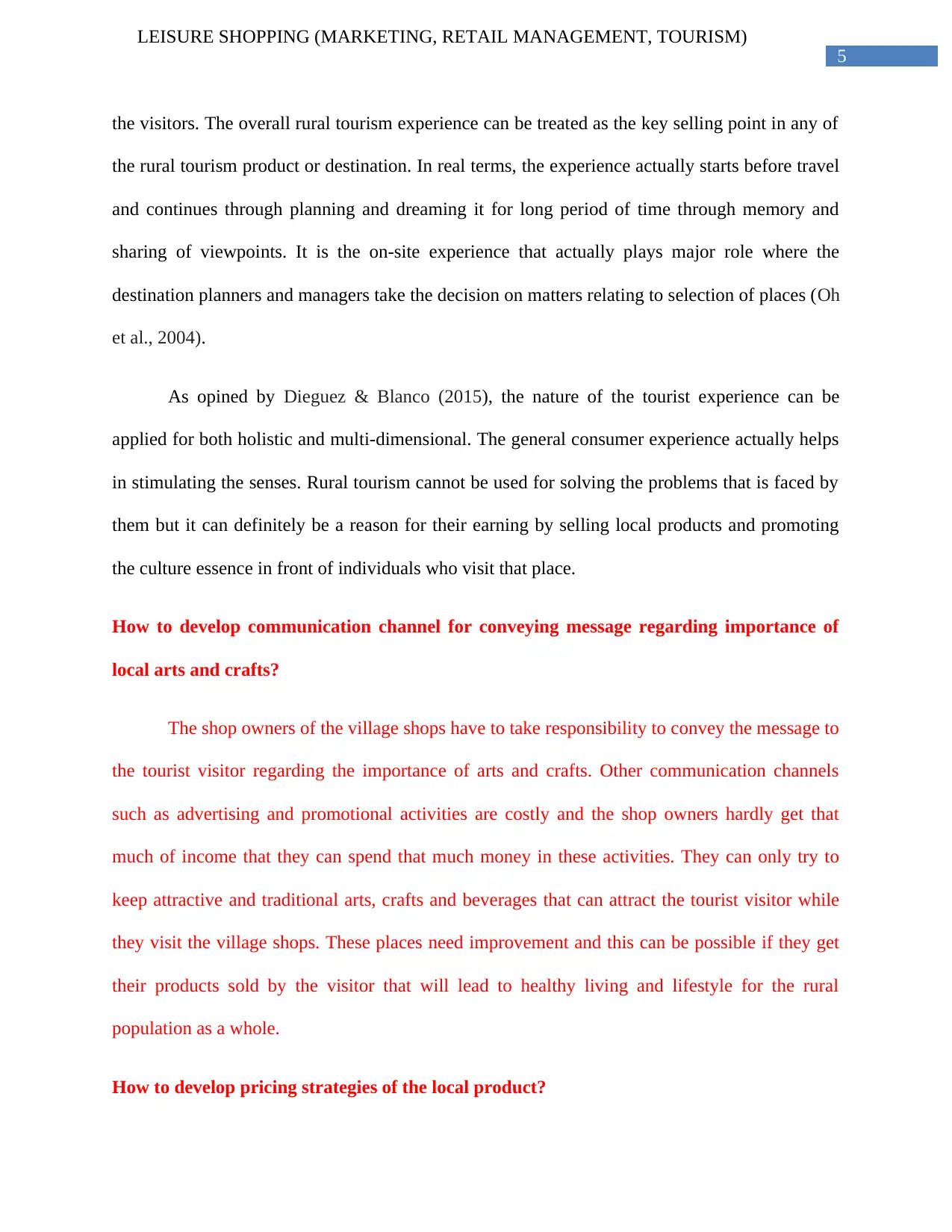
5
LEISURE SHOPPING (MARKETING, RETAIL MANAGEMENT, TOURISM)
the visitors. The overall rural tourism experience can be treated as the key selling point in any of
the rural tourism product or destination. In real terms, the experience actually starts before travel
and continues through planning and dreaming it for long period of time through memory and
sharing of viewpoints. It is the on-site experience that actually plays major role where the
destination planners and managers take the decision on matters relating to selection of places (Oh
et al., 2004).
As opined by Dieguez & Blanco (2015), the nature of the tourist experience can be
applied for both holistic and multi-dimensional. The general consumer experience actually helps
in stimulating the senses. Rural tourism cannot be used for solving the problems that is faced by
them but it can definitely be a reason for their earning by selling local products and promoting
the culture essence in front of individuals who visit that place.
How to develop communication channel for conveying message regarding importance of
local arts and crafts?
The shop owners of the village shops have to take responsibility to convey the message to
the tourist visitor regarding the importance of arts and crafts. Other communication channels
such as advertising and promotional activities are costly and the shop owners hardly get that
much of income that they can spend that much money in these activities. They can only try to
keep attractive and traditional arts, crafts and beverages that can attract the tourist visitor while
they visit the village shops. These places need improvement and this can be possible if they get
their products sold by the visitor that will lead to healthy living and lifestyle for the rural
population as a whole.
How to develop pricing strategies of the local product?
LEISURE SHOPPING (MARKETING, RETAIL MANAGEMENT, TOURISM)
the visitors. The overall rural tourism experience can be treated as the key selling point in any of
the rural tourism product or destination. In real terms, the experience actually starts before travel
and continues through planning and dreaming it for long period of time through memory and
sharing of viewpoints. It is the on-site experience that actually plays major role where the
destination planners and managers take the decision on matters relating to selection of places (Oh
et al., 2004).
As opined by Dieguez & Blanco (2015), the nature of the tourist experience can be
applied for both holistic and multi-dimensional. The general consumer experience actually helps
in stimulating the senses. Rural tourism cannot be used for solving the problems that is faced by
them but it can definitely be a reason for their earning by selling local products and promoting
the culture essence in front of individuals who visit that place.
How to develop communication channel for conveying message regarding importance of
local arts and crafts?
The shop owners of the village shops have to take responsibility to convey the message to
the tourist visitor regarding the importance of arts and crafts. Other communication channels
such as advertising and promotional activities are costly and the shop owners hardly get that
much of income that they can spend that much money in these activities. They can only try to
keep attractive and traditional arts, crafts and beverages that can attract the tourist visitor while
they visit the village shops. These places need improvement and this can be possible if they get
their products sold by the visitor that will lead to healthy living and lifestyle for the rural
population as a whole.
How to develop pricing strategies of the local product?
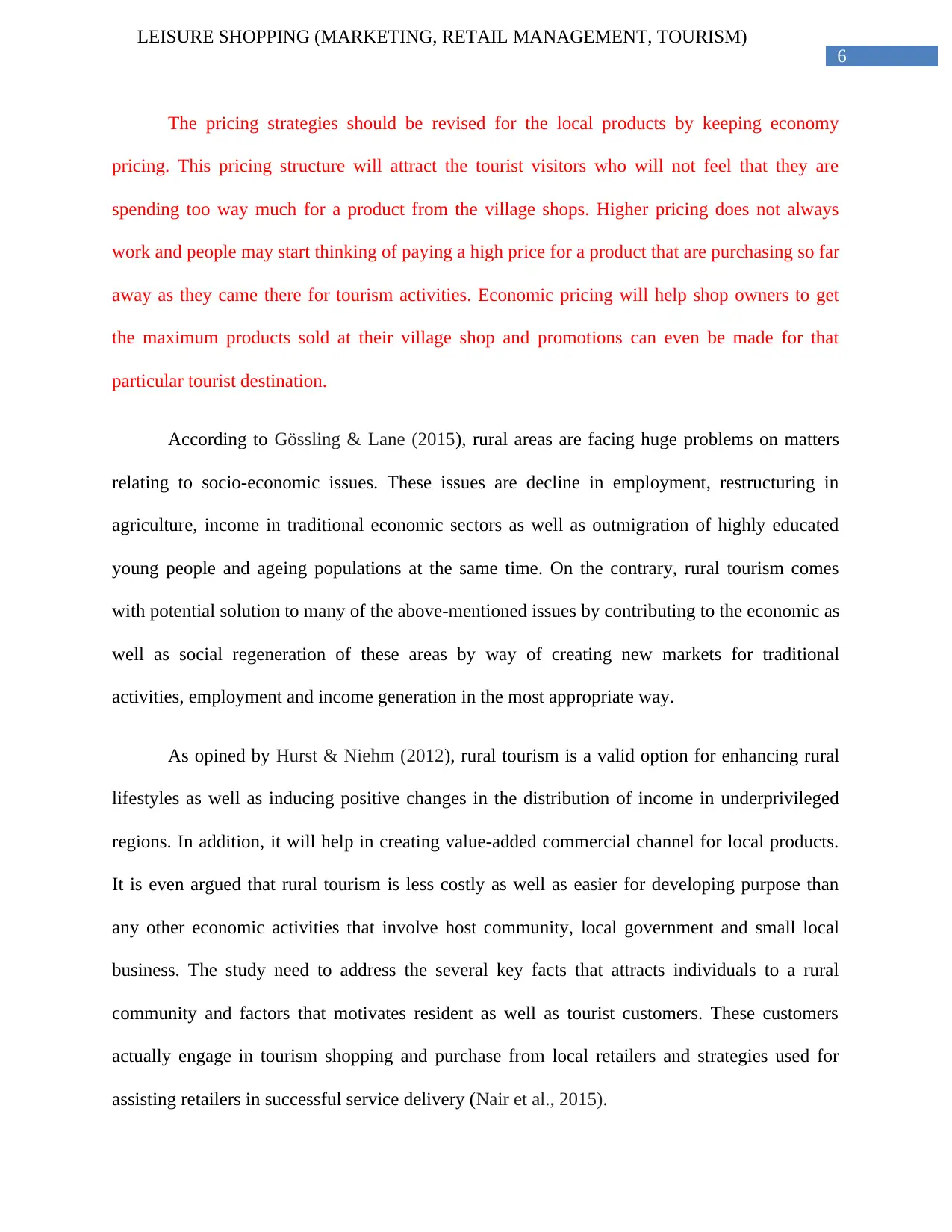
6
LEISURE SHOPPING (MARKETING, RETAIL MANAGEMENT, TOURISM)
The pricing strategies should be revised for the local products by keeping economy
pricing. This pricing structure will attract the tourist visitors who will not feel that they are
spending too way much for a product from the village shops. Higher pricing does not always
work and people may start thinking of paying a high price for a product that are purchasing so far
away as they came there for tourism activities. Economic pricing will help shop owners to get
the maximum products sold at their village shop and promotions can even be made for that
particular tourist destination.
According to Gössling & Lane (2015), rural areas are facing huge problems on matters
relating to socio-economic issues. These issues are decline in employment, restructuring in
agriculture, income in traditional economic sectors as well as outmigration of highly educated
young people and ageing populations at the same time. On the contrary, rural tourism comes
with potential solution to many of the above-mentioned issues by contributing to the economic as
well as social regeneration of these areas by way of creating new markets for traditional
activities, employment and income generation in the most appropriate way.
As opined by Hurst & Niehm (2012), rural tourism is a valid option for enhancing rural
lifestyles as well as inducing positive changes in the distribution of income in underprivileged
regions. In addition, it will help in creating value-added commercial channel for local products.
It is even argued that rural tourism is less costly as well as easier for developing purpose than
any other economic activities that involve host community, local government and small local
business. The study need to address the several key facts that attracts individuals to a rural
community and factors that motivates resident as well as tourist customers. These customers
actually engage in tourism shopping and purchase from local retailers and strategies used for
assisting retailers in successful service delivery (Nair et al., 2015).
LEISURE SHOPPING (MARKETING, RETAIL MANAGEMENT, TOURISM)
The pricing strategies should be revised for the local products by keeping economy
pricing. This pricing structure will attract the tourist visitors who will not feel that they are
spending too way much for a product from the village shops. Higher pricing does not always
work and people may start thinking of paying a high price for a product that are purchasing so far
away as they came there for tourism activities. Economic pricing will help shop owners to get
the maximum products sold at their village shop and promotions can even be made for that
particular tourist destination.
According to Gössling & Lane (2015), rural areas are facing huge problems on matters
relating to socio-economic issues. These issues are decline in employment, restructuring in
agriculture, income in traditional economic sectors as well as outmigration of highly educated
young people and ageing populations at the same time. On the contrary, rural tourism comes
with potential solution to many of the above-mentioned issues by contributing to the economic as
well as social regeneration of these areas by way of creating new markets for traditional
activities, employment and income generation in the most appropriate way.
As opined by Hurst & Niehm (2012), rural tourism is a valid option for enhancing rural
lifestyles as well as inducing positive changes in the distribution of income in underprivileged
regions. In addition, it will help in creating value-added commercial channel for local products.
It is even argued that rural tourism is less costly as well as easier for developing purpose than
any other economic activities that involve host community, local government and small local
business. The study need to address the several key facts that attracts individuals to a rural
community and factors that motivates resident as well as tourist customers. These customers
actually engage in tourism shopping and purchase from local retailers and strategies used for
assisting retailers in successful service delivery (Nair et al., 2015).
⊘ This is a preview!⊘
Do you want full access?
Subscribe today to unlock all pages.

Trusted by 1+ million students worldwide
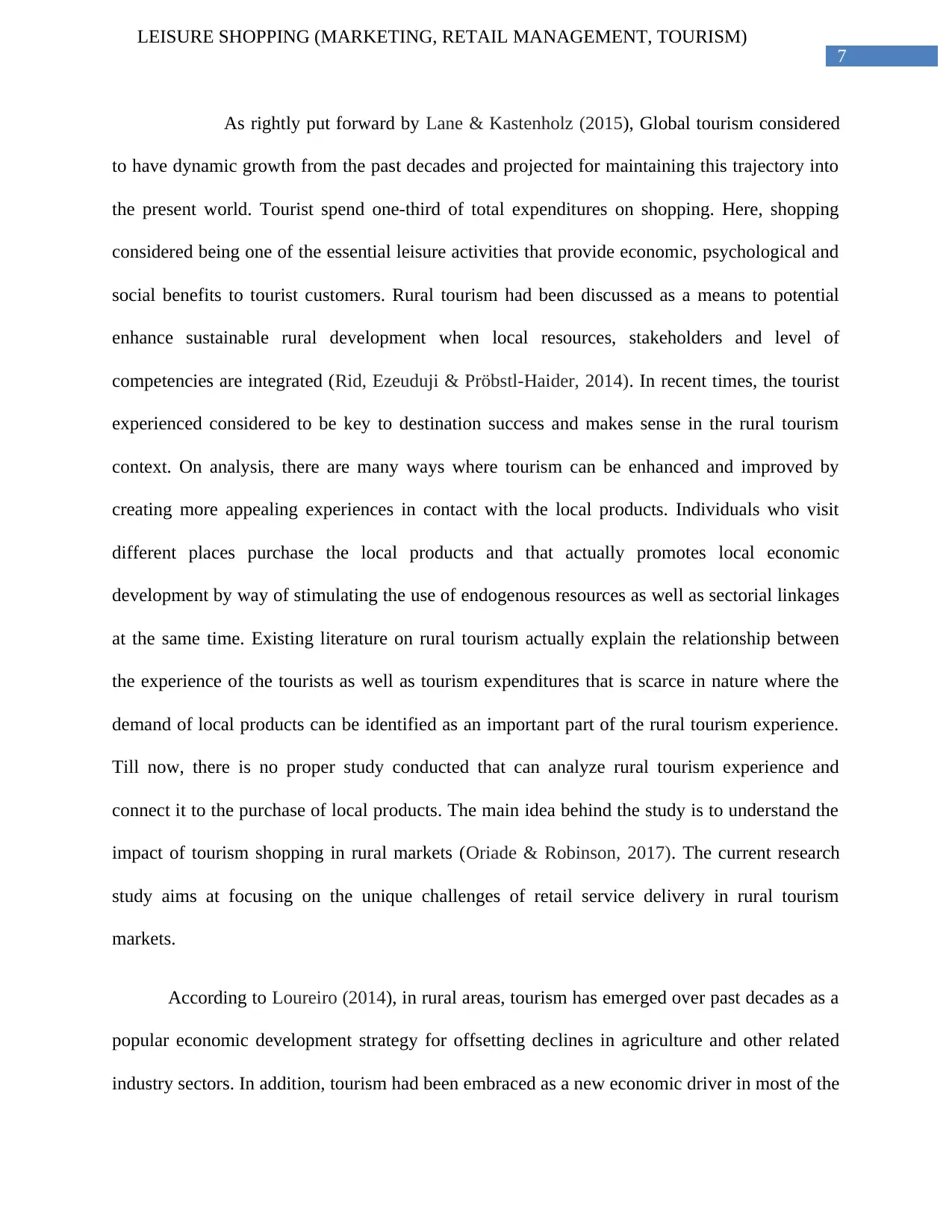
7
LEISURE SHOPPING (MARKETING, RETAIL MANAGEMENT, TOURISM)
As rightly put forward by Lane & Kastenholz (2015), Global tourism considered
to have dynamic growth from the past decades and projected for maintaining this trajectory into
the present world. Tourist spend one-third of total expenditures on shopping. Here, shopping
considered being one of the essential leisure activities that provide economic, psychological and
social benefits to tourist customers. Rural tourism had been discussed as a means to potential
enhance sustainable rural development when local resources, stakeholders and level of
competencies are integrated (Rid, Ezeuduji & Pröbstl-Haider, 2014). In recent times, the tourist
experienced considered to be key to destination success and makes sense in the rural tourism
context. On analysis, there are many ways where tourism can be enhanced and improved by
creating more appealing experiences in contact with the local products. Individuals who visit
different places purchase the local products and that actually promotes local economic
development by way of stimulating the use of endogenous resources as well as sectorial linkages
at the same time. Existing literature on rural tourism actually explain the relationship between
the experience of the tourists as well as tourism expenditures that is scarce in nature where the
demand of local products can be identified as an important part of the rural tourism experience.
Till now, there is no proper study conducted that can analyze rural tourism experience and
connect it to the purchase of local products. The main idea behind the study is to understand the
impact of tourism shopping in rural markets (Oriade & Robinson, 2017). The current research
study aims at focusing on the unique challenges of retail service delivery in rural tourism
markets.
According to Loureiro (2014), in rural areas, tourism has emerged over past decades as a
popular economic development strategy for offsetting declines in agriculture and other related
industry sectors. In addition, tourism had been embraced as a new economic driver in most of the
LEISURE SHOPPING (MARKETING, RETAIL MANAGEMENT, TOURISM)
As rightly put forward by Lane & Kastenholz (2015), Global tourism considered
to have dynamic growth from the past decades and projected for maintaining this trajectory into
the present world. Tourist spend one-third of total expenditures on shopping. Here, shopping
considered being one of the essential leisure activities that provide economic, psychological and
social benefits to tourist customers. Rural tourism had been discussed as a means to potential
enhance sustainable rural development when local resources, stakeholders and level of
competencies are integrated (Rid, Ezeuduji & Pröbstl-Haider, 2014). In recent times, the tourist
experienced considered to be key to destination success and makes sense in the rural tourism
context. On analysis, there are many ways where tourism can be enhanced and improved by
creating more appealing experiences in contact with the local products. Individuals who visit
different places purchase the local products and that actually promotes local economic
development by way of stimulating the use of endogenous resources as well as sectorial linkages
at the same time. Existing literature on rural tourism actually explain the relationship between
the experience of the tourists as well as tourism expenditures that is scarce in nature where the
demand of local products can be identified as an important part of the rural tourism experience.
Till now, there is no proper study conducted that can analyze rural tourism experience and
connect it to the purchase of local products. The main idea behind the study is to understand the
impact of tourism shopping in rural markets (Oriade & Robinson, 2017). The current research
study aims at focusing on the unique challenges of retail service delivery in rural tourism
markets.
According to Loureiro (2014), in rural areas, tourism has emerged over past decades as a
popular economic development strategy for offsetting declines in agriculture and other related
industry sectors. In addition, tourism had been embraced as a new economic driver in most of the
Paraphrase This Document
Need a fresh take? Get an instant paraphrase of this document with our AI Paraphraser
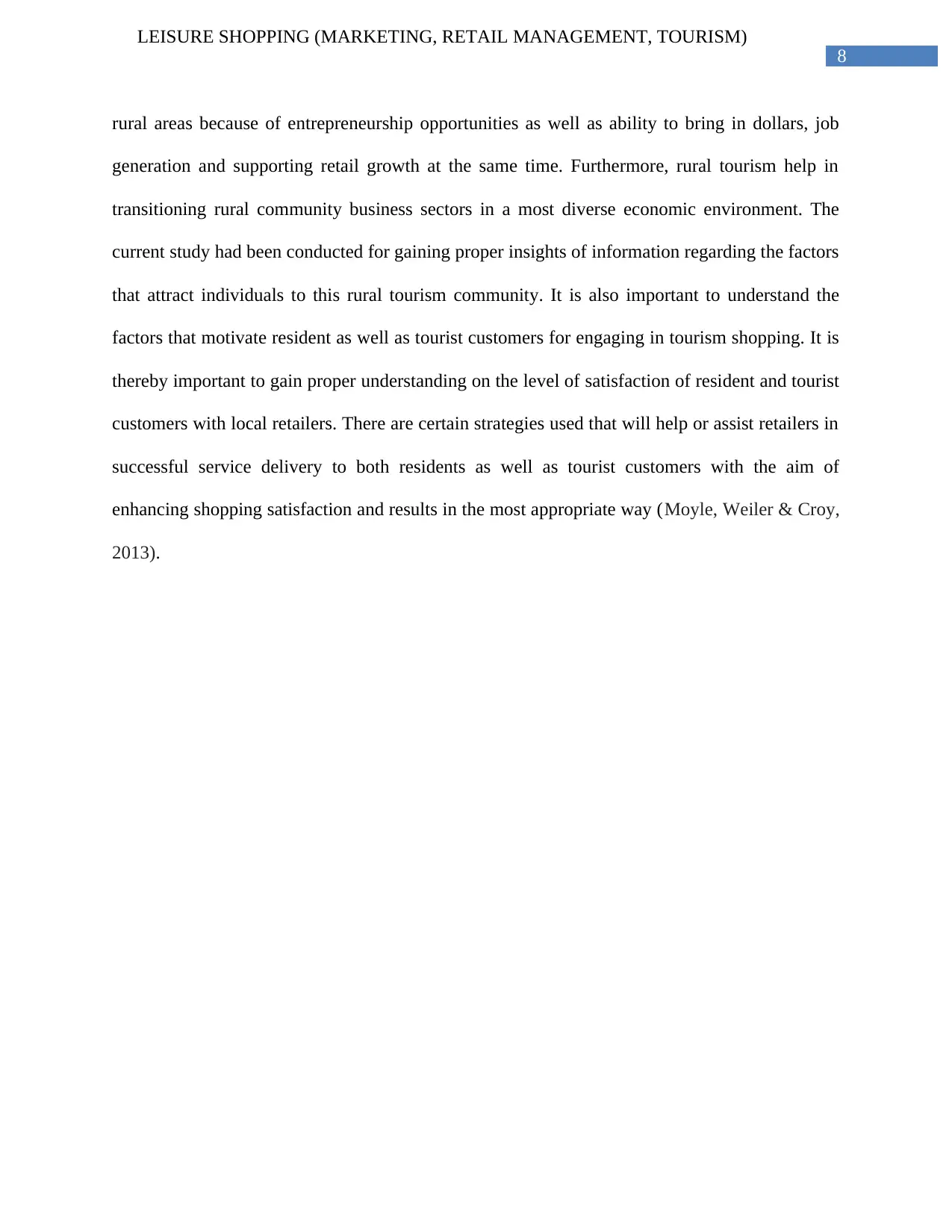
8
LEISURE SHOPPING (MARKETING, RETAIL MANAGEMENT, TOURISM)
rural areas because of entrepreneurship opportunities as well as ability to bring in dollars, job
generation and supporting retail growth at the same time. Furthermore, rural tourism help in
transitioning rural community business sectors in a most diverse economic environment. The
current study had been conducted for gaining proper insights of information regarding the factors
that attract individuals to this rural tourism community. It is also important to understand the
factors that motivate resident as well as tourist customers for engaging in tourism shopping. It is
thereby important to gain proper understanding on the level of satisfaction of resident and tourist
customers with local retailers. There are certain strategies used that will help or assist retailers in
successful service delivery to both residents as well as tourist customers with the aim of
enhancing shopping satisfaction and results in the most appropriate way (Moyle, Weiler & Croy,
2013).
LEISURE SHOPPING (MARKETING, RETAIL MANAGEMENT, TOURISM)
rural areas because of entrepreneurship opportunities as well as ability to bring in dollars, job
generation and supporting retail growth at the same time. Furthermore, rural tourism help in
transitioning rural community business sectors in a most diverse economic environment. The
current study had been conducted for gaining proper insights of information regarding the factors
that attract individuals to this rural tourism community. It is also important to understand the
factors that motivate resident as well as tourist customers for engaging in tourism shopping. It is
thereby important to gain proper understanding on the level of satisfaction of resident and tourist
customers with local retailers. There are certain strategies used that will help or assist retailers in
successful service delivery to both residents as well as tourist customers with the aim of
enhancing shopping satisfaction and results in the most appropriate way (Moyle, Weiler & Croy,
2013).
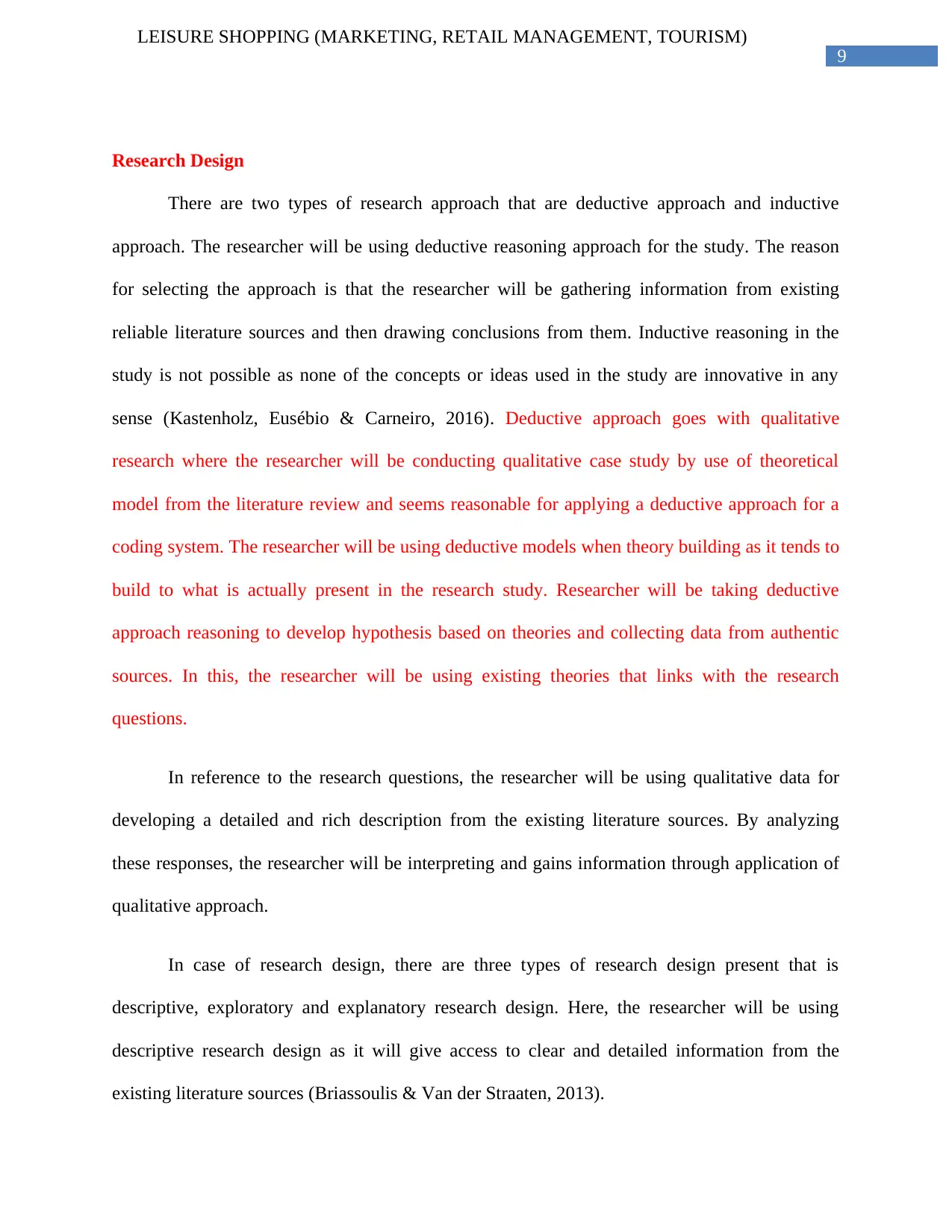
9
LEISURE SHOPPING (MARKETING, RETAIL MANAGEMENT, TOURISM)
Research Design
There are two types of research approach that are deductive approach and inductive
approach. The researcher will be using deductive reasoning approach for the study. The reason
for selecting the approach is that the researcher will be gathering information from existing
reliable literature sources and then drawing conclusions from them. Inductive reasoning in the
study is not possible as none of the concepts or ideas used in the study are innovative in any
sense (Kastenholz, Eusébio & Carneiro, 2016). Deductive approach goes with qualitative
research where the researcher will be conducting qualitative case study by use of theoretical
model from the literature review and seems reasonable for applying a deductive approach for a
coding system. The researcher will be using deductive models when theory building as it tends to
build to what is actually present in the research study. Researcher will be taking deductive
approach reasoning to develop hypothesis based on theories and collecting data from authentic
sources. In this, the researcher will be using existing theories that links with the research
questions.
In reference to the research questions, the researcher will be using qualitative data for
developing a detailed and rich description from the existing literature sources. By analyzing
these responses, the researcher will be interpreting and gains information through application of
qualitative approach.
In case of research design, there are three types of research design present that is
descriptive, exploratory and explanatory research design. Here, the researcher will be using
descriptive research design as it will give access to clear and detailed information from the
existing literature sources (Briassoulis & Van der Straaten, 2013).
LEISURE SHOPPING (MARKETING, RETAIL MANAGEMENT, TOURISM)
Research Design
There are two types of research approach that are deductive approach and inductive
approach. The researcher will be using deductive reasoning approach for the study. The reason
for selecting the approach is that the researcher will be gathering information from existing
reliable literature sources and then drawing conclusions from them. Inductive reasoning in the
study is not possible as none of the concepts or ideas used in the study are innovative in any
sense (Kastenholz, Eusébio & Carneiro, 2016). Deductive approach goes with qualitative
research where the researcher will be conducting qualitative case study by use of theoretical
model from the literature review and seems reasonable for applying a deductive approach for a
coding system. The researcher will be using deductive models when theory building as it tends to
build to what is actually present in the research study. Researcher will be taking deductive
approach reasoning to develop hypothesis based on theories and collecting data from authentic
sources. In this, the researcher will be using existing theories that links with the research
questions.
In reference to the research questions, the researcher will be using qualitative data for
developing a detailed and rich description from the existing literature sources. By analyzing
these responses, the researcher will be interpreting and gains information through application of
qualitative approach.
In case of research design, there are three types of research design present that is
descriptive, exploratory and explanatory research design. Here, the researcher will be using
descriptive research design as it will give access to clear and detailed information from the
existing literature sources (Briassoulis & Van der Straaten, 2013).
⊘ This is a preview!⊘
Do you want full access?
Subscribe today to unlock all pages.

Trusted by 1+ million students worldwide
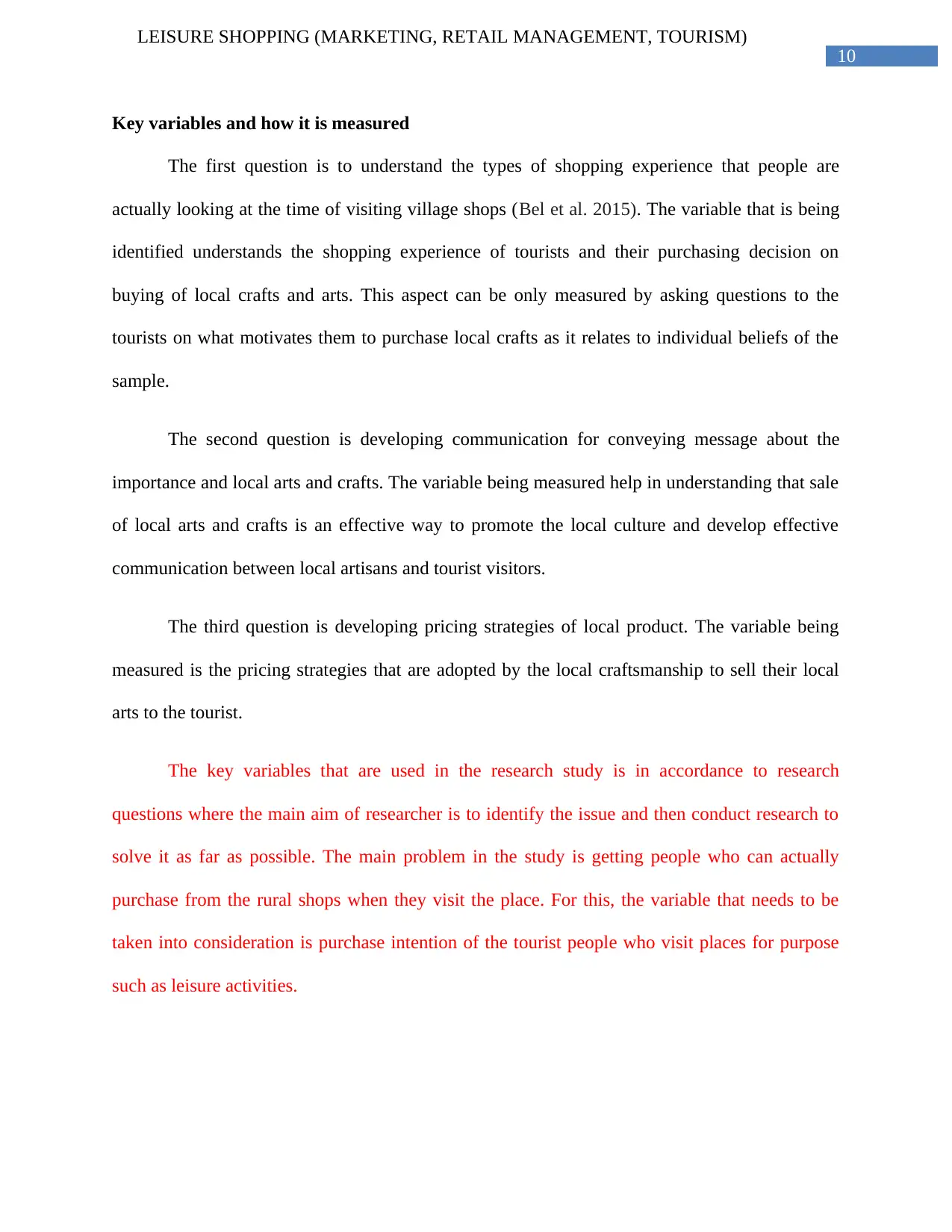
10
LEISURE SHOPPING (MARKETING, RETAIL MANAGEMENT, TOURISM)
Key variables and how it is measured
The first question is to understand the types of shopping experience that people are
actually looking at the time of visiting village shops (Bel et al. 2015). The variable that is being
identified understands the shopping experience of tourists and their purchasing decision on
buying of local crafts and arts. This aspect can be only measured by asking questions to the
tourists on what motivates them to purchase local crafts as it relates to individual beliefs of the
sample.
The second question is developing communication for conveying message about the
importance and local arts and crafts. The variable being measured help in understanding that sale
of local arts and crafts is an effective way to promote the local culture and develop effective
communication between local artisans and tourist visitors.
The third question is developing pricing strategies of local product. The variable being
measured is the pricing strategies that are adopted by the local craftsmanship to sell their local
arts to the tourist.
The key variables that are used in the research study is in accordance to research
questions where the main aim of researcher is to identify the issue and then conduct research to
solve it as far as possible. The main problem in the study is getting people who can actually
purchase from the rural shops when they visit the place. For this, the variable that needs to be
taken into consideration is purchase intention of the tourist people who visit places for purpose
such as leisure activities.
LEISURE SHOPPING (MARKETING, RETAIL MANAGEMENT, TOURISM)
Key variables and how it is measured
The first question is to understand the types of shopping experience that people are
actually looking at the time of visiting village shops (Bel et al. 2015). The variable that is being
identified understands the shopping experience of tourists and their purchasing decision on
buying of local crafts and arts. This aspect can be only measured by asking questions to the
tourists on what motivates them to purchase local crafts as it relates to individual beliefs of the
sample.
The second question is developing communication for conveying message about the
importance and local arts and crafts. The variable being measured help in understanding that sale
of local arts and crafts is an effective way to promote the local culture and develop effective
communication between local artisans and tourist visitors.
The third question is developing pricing strategies of local product. The variable being
measured is the pricing strategies that are adopted by the local craftsmanship to sell their local
arts to the tourist.
The key variables that are used in the research study is in accordance to research
questions where the main aim of researcher is to identify the issue and then conduct research to
solve it as far as possible. The main problem in the study is getting people who can actually
purchase from the rural shops when they visit the place. For this, the variable that needs to be
taken into consideration is purchase intention of the tourist people who visit places for purpose
such as leisure activities.
Paraphrase This Document
Need a fresh take? Get an instant paraphrase of this document with our AI Paraphraser
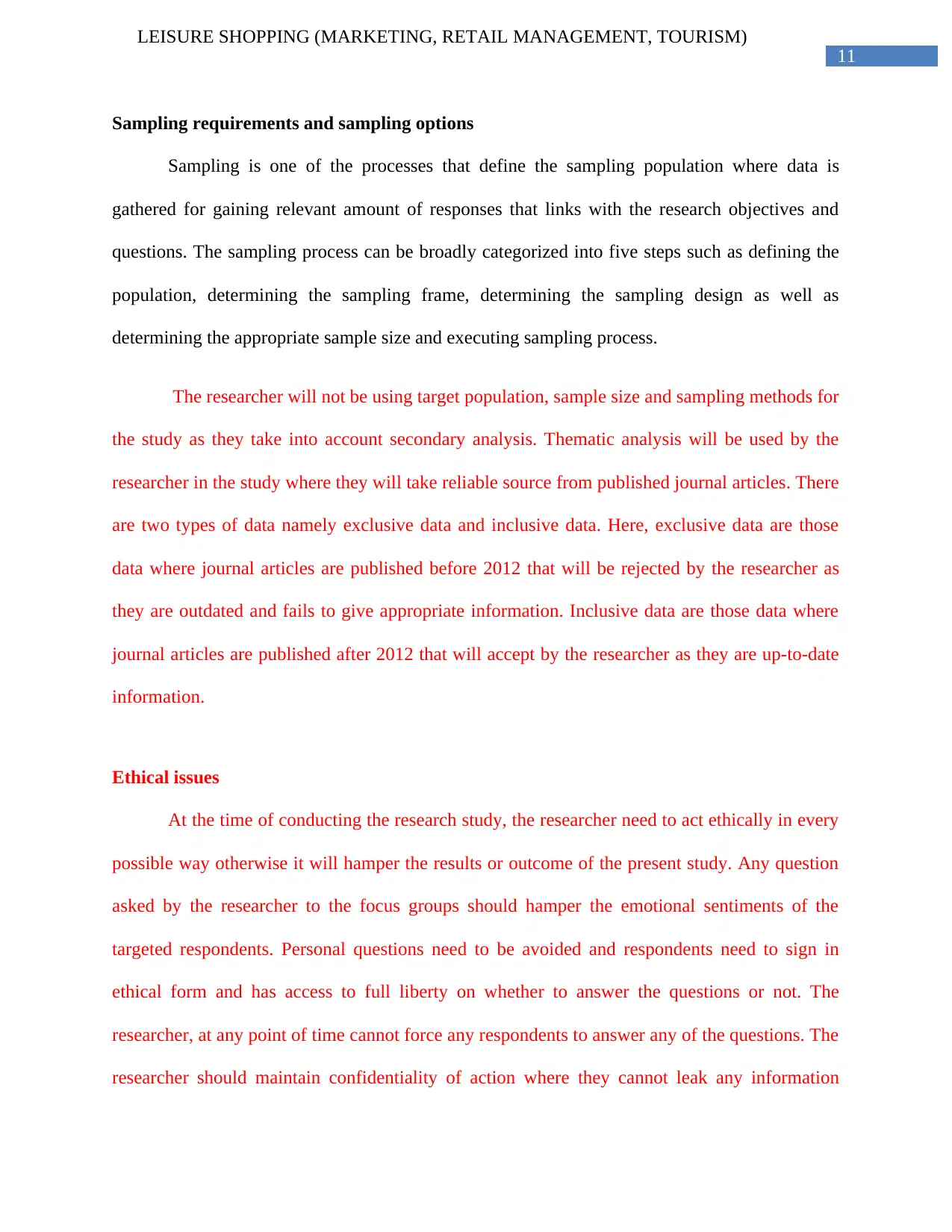
11
LEISURE SHOPPING (MARKETING, RETAIL MANAGEMENT, TOURISM)
Sampling requirements and sampling options
Sampling is one of the processes that define the sampling population where data is
gathered for gaining relevant amount of responses that links with the research objectives and
questions. The sampling process can be broadly categorized into five steps such as defining the
population, determining the sampling frame, determining the sampling design as well as
determining the appropriate sample size and executing sampling process.
The researcher will not be using target population, sample size and sampling methods for
the study as they take into account secondary analysis. Thematic analysis will be used by the
researcher in the study where they will take reliable source from published journal articles. There
are two types of data namely exclusive data and inclusive data. Here, exclusive data are those
data where journal articles are published before 2012 that will be rejected by the researcher as
they are outdated and fails to give appropriate information. Inclusive data are those data where
journal articles are published after 2012 that will accept by the researcher as they are up-to-date
information.
Ethical issues
At the time of conducting the research study, the researcher need to act ethically in every
possible way otherwise it will hamper the results or outcome of the present study. Any question
asked by the researcher to the focus groups should hamper the emotional sentiments of the
targeted respondents. Personal questions need to be avoided and respondents need to sign in
ethical form and has access to full liberty on whether to answer the questions or not. The
researcher, at any point of time cannot force any respondents to answer any of the questions. The
researcher should maintain confidentiality of action where they cannot leak any information
LEISURE SHOPPING (MARKETING, RETAIL MANAGEMENT, TOURISM)
Sampling requirements and sampling options
Sampling is one of the processes that define the sampling population where data is
gathered for gaining relevant amount of responses that links with the research objectives and
questions. The sampling process can be broadly categorized into five steps such as defining the
population, determining the sampling frame, determining the sampling design as well as
determining the appropriate sample size and executing sampling process.
The researcher will not be using target population, sample size and sampling methods for
the study as they take into account secondary analysis. Thematic analysis will be used by the
researcher in the study where they will take reliable source from published journal articles. There
are two types of data namely exclusive data and inclusive data. Here, exclusive data are those
data where journal articles are published before 2012 that will be rejected by the researcher as
they are outdated and fails to give appropriate information. Inclusive data are those data where
journal articles are published after 2012 that will accept by the researcher as they are up-to-date
information.
Ethical issues
At the time of conducting the research study, the researcher need to act ethically in every
possible way otherwise it will hamper the results or outcome of the present study. Any question
asked by the researcher to the focus groups should hamper the emotional sentiments of the
targeted respondents. Personal questions need to be avoided and respondents need to sign in
ethical form and has access to full liberty on whether to answer the questions or not. The
researcher, at any point of time cannot force any respondents to answer any of the questions. The
researcher should maintain confidentiality of action where they cannot leak any information
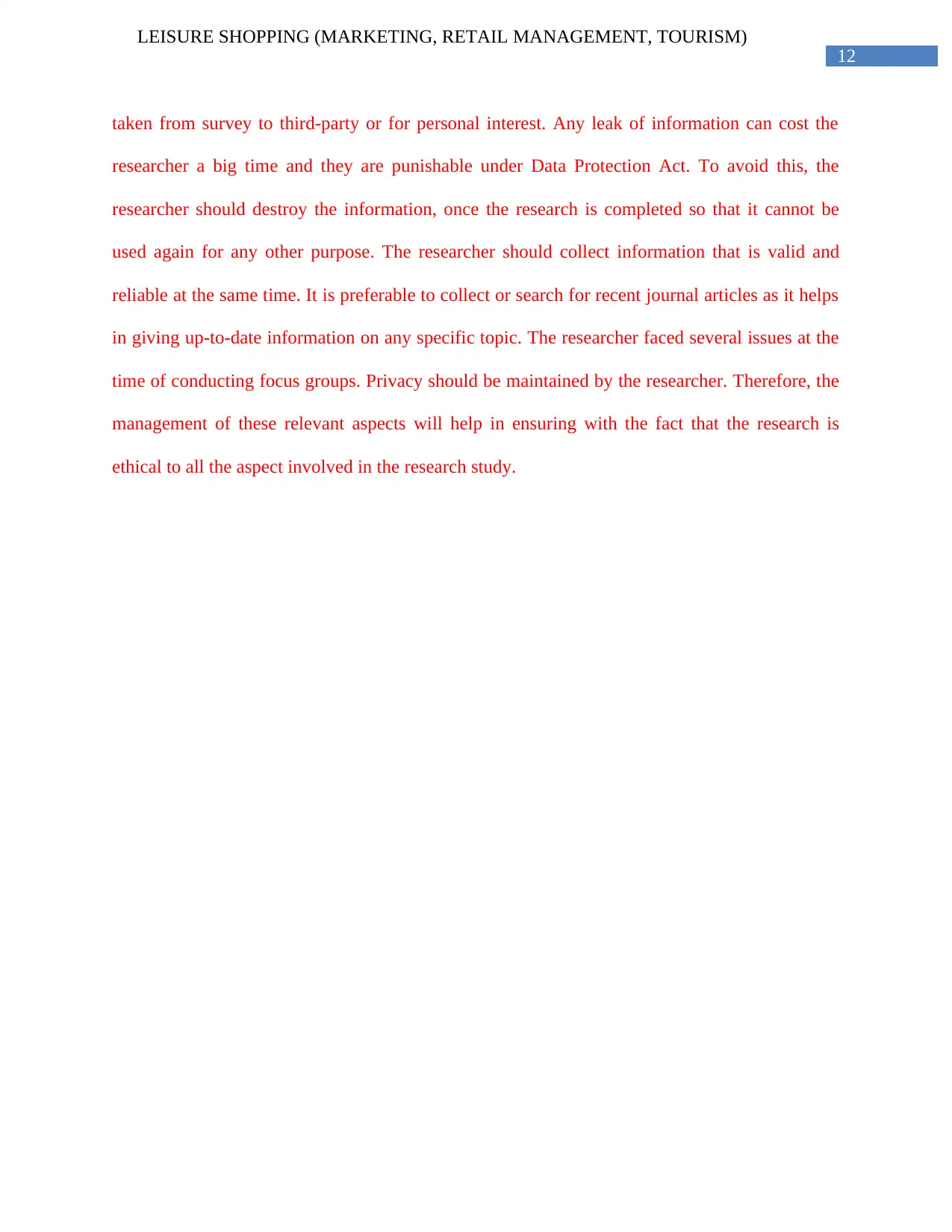
12
LEISURE SHOPPING (MARKETING, RETAIL MANAGEMENT, TOURISM)
taken from survey to third-party or for personal interest. Any leak of information can cost the
researcher a big time and they are punishable under Data Protection Act. To avoid this, the
researcher should destroy the information, once the research is completed so that it cannot be
used again for any other purpose. The researcher should collect information that is valid and
reliable at the same time. It is preferable to collect or search for recent journal articles as it helps
in giving up-to-date information on any specific topic. The researcher faced several issues at the
time of conducting focus groups. Privacy should be maintained by the researcher. Therefore, the
management of these relevant aspects will help in ensuring with the fact that the research is
ethical to all the aspect involved in the research study.
LEISURE SHOPPING (MARKETING, RETAIL MANAGEMENT, TOURISM)
taken from survey to third-party or for personal interest. Any leak of information can cost the
researcher a big time and they are punishable under Data Protection Act. To avoid this, the
researcher should destroy the information, once the research is completed so that it cannot be
used again for any other purpose. The researcher should collect information that is valid and
reliable at the same time. It is preferable to collect or search for recent journal articles as it helps
in giving up-to-date information on any specific topic. The researcher faced several issues at the
time of conducting focus groups. Privacy should be maintained by the researcher. Therefore, the
management of these relevant aspects will help in ensuring with the fact that the research is
ethical to all the aspect involved in the research study.
⊘ This is a preview!⊘
Do you want full access?
Subscribe today to unlock all pages.

Trusted by 1+ million students worldwide
1 out of 15
Related Documents
Your All-in-One AI-Powered Toolkit for Academic Success.
+13062052269
info@desklib.com
Available 24*7 on WhatsApp / Email
![[object Object]](/_next/static/media/star-bottom.7253800d.svg)
Unlock your academic potential
Copyright © 2020–2026 A2Z Services. All Rights Reserved. Developed and managed by ZUCOL.




